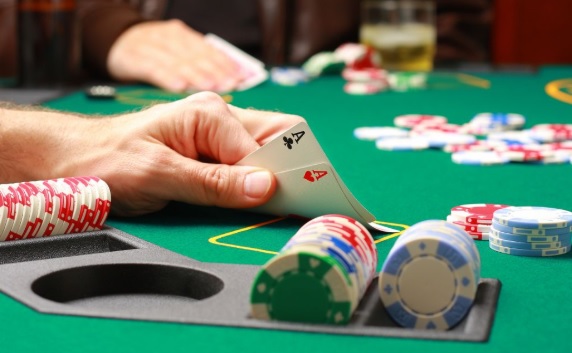Folding a poker hand is the answer on the surface, and you may think it is a simple answer, but there is more to the question than that. We will give you the simple answer or a more in-depth answer in this article.
First of all.
Folding is when a player is forced to give up a hand in a poker game. Folded hands are discarded and thrown into the “trash”, also known as the discard pile. The term comes from the way discarded cards are folded, usually with a piece of tape on top of them to identify them as unusable at a later date. Only the player who threw the card into the discard pile can choose to discard it or exit the current hand. Players who discard lose any chance of winning the hand, but keep their chips and stay in the game in case they receive another winning combination. You can also verbally declare “discard”, which is a binding comment, and throw your cards into the garbage.
Sometimes your cards are stacked against you. When you see a hand that is doomed to fail, fold so you can try again with another hand. If another player takes their hand and includes your hand again on the next turn, then you may be the winner if you didn’t fold before! Never have what is known as “fold regret”, where players get upset by folding because they end up hitting a big hand. You can’t predict what cards will come, so focus on making the right long-term decisions, not on the hands you missed.
When to Fold
When you fold a hand, you’re actually saying “I don’t care how the hand turns out, so I’m not going to play it. By folding, you are protecting your money while allowing other players to gamble. The Fold app uses expert tips and advice to help you make the right moves, making it easy to know when to fold and when to hold. Sometimes it’s hard to know when to fold. But if you’re not willing to fold at the right time, you’re going to lose money.
The first rule of thumb you should follow is to never marry anyone. This includes pocket aces, which are the best starting hand in Texas Hold’em. One of the things you’ll learn quickly as you gain some experience in the game is that the best pre-flop hand doesn’t always win. In fact, pocket aces only win about 9 out of 10 random hands, which means that on average they lose 10 out of every 100 times.
When playing poker, don’t be stubborn. If you have a weak hand, you can discard the big cards from time to time. That way, if you do get lucky and win the big prize, the other players will realize that you just got lucky and played smart by discarding weak hands. When the flop, turn and river are a bit risky for your hand (four of a kind), don’t be stubborn. If you have a weak hand, you can discard the big cards from time to time.
Another time to fold is pre-flop when you have a mediocre starting hand, such as 7-2, 2-3, 10-4, J-5, etc. You can’t fold just because you didn’t put in the bottom pot. You can’t lose money by not putting in the pot. This is a motto you should live by. A bad pre-flop hand will rarely lead to a big win. When you have one of these hands, fold before you put your chips in the pot. It is also very likely that you will hit a certain type of in-suit straight or flush draw. In this case, if your brave opponent doesn’t fold, it’s a good move to raise in front position before the flop.
Another example of when you should get your cards dirty is when you don’t connect to the board and don’t have any draws. Let’s say you have a J-10 non-flush and the flop is 4-7-K. You have only a jack-high, only a backdoor straight to listen to, and less than a 5% chance of hitting. Unless you have a good read on your betting opponent and are convinced he is bluffing, fold. There is no reason to invest more chips in a hand that has little chance of winning.
Does that sound Greek to you? Let’s put it more simply: If you have a bad hand, you have nothing, and little hope of catching anything, fold.
When You Shouldn’t Fold
When it comes to poker, folding is a key skill you must master if you want to win. It’s more fun to play a hand that has a chance of getting some chips, but in many cases you should absolutely avoid folding. Extensive research in recent years has shown that folding is a very good strategy when your hand doesn’t have much of a chance and you don’t like the way the odds are falling, or if you are intimidated by your opponents. For example, if you have a pair of aces, but your opponent has three cards in a row on the flop, and another player has two cards in a row on the common, you should fold. Your opponent is likely to hold a straight or a flush, and over time you will win more poker games by avoiding these positions rather than playing them.
One such time is pre-flop, when you hold strong cards like pocket Aces, Kings, Queens or JJ, or AK, AQ and certain other pocket pairs (as the case may be). In a game like Omaha Texas Hold’em, starting hands with a pair and double suits should almost never be discarded, at least pre-flop. You’ll make more money by playing good starting hands, so don’t fold.
You also shouldn’t fold when you are heavily connected on the flop, turn and river. So if you have AK and the flop is AK-3, it would be unwise to fold on this occasion. You have top two pair, which is a strong hand in Texas Hold’em. In fact, not only should you not fold, but you should raise.
It is very common for beginners to fold as soon as they get to the junk. That’s why I suggest you don’t do it. Think about your fantasy league. What would happen if everyone thought their opponent’s hand was better than theirs until they saw it? All the great players in my fantasy league would lose games because of this bad habit. Playing blackjack well requires you to look at your opponent’s cards first and then decide how to play your hand. By doing this, you have a much better chance of winning in the long run.
Poker is a game of information, and some players think that the more information they have, the better they will do. Guess what? It’s true too. In some cases, one player will say they have a hand ( for example, a flush) before actually showing their cards, while another player will just fold quickly.
For single player games, the computer will automatically act as your opponent. You can also let the computer face two other players. The goal of any hand is to collect at least 3 hands of the same value, regardless of their suit. The number on each card varies according to its corresponding value, but is always greater than zero and less than seven.










